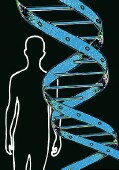
WEDNESDAY, April 23, 2014 (HealthDay News) — Certain genes on the Y chromosome may have ensured the survival of males, a new study indicates.
These genes have little if anything to do with sperm production or determining gender. Rather, they appear to be active throughout the body and may contribute to male-female differences in disease susceptibility and severity, the researchers said.
Women have two X chromosomes while men have an X and a Y chromosome. Previous research has shown a history of significant genetic decay in the Y chromosome. This has led some to claim that the Y chromosome is doomed to extinction.
“This paper tells us that not only is the Y chromosome here to stay, but that we need to take it seriously, and not just in the reproductive tract,” David Page, director of the Whitehead Institute for Biomedical Research in Cambridge, Mass., said in an institute news release.
Page’s lab conducted the research with colleagues from Washington University in St. Louis and the Baylor College of Medicine in Hoston.
“There are approximately a dozen genes conserved on the Y that are [activated] in cells and tissue types throughout the body,” Page said. “These are genes involved in decoding and interpreting the entirety of the genome. How pervasive their effects are is a question we throw open to the field, and it’s one we can no longer ignore.”
The Y chromosome has only 19 of the more than 600 genes it once shared with the X chromosome. But the researchers compared the human Y chromosome to that of the chimpanzee and the rhesus macaque and found that the human Y version has lost only one ancestral gene over the past 25 million years and has been stable since then.
The investigators also studied the Y chromosomes in five distantly related mammals: the marmoset, mouse, rat, bull and opossum. The ancestral portions of the Y chromosomes in all eight species contained the same set of broadly expressed genes, each of which is matched on the X chromosome, they found.
Page said the conserved genes on the Y chromosome are no accident, and referred to them as “an elite bunch of genes.”
“Evolution is telling us these genes are really important for survival,” study author Winston Bellott, a research scientist in the Page lab, said in the news release. “They’ve been selected and purified over time.”
The next step in this line of research is to find out what this set of Y chromosome genes actually does.
The study was recently published in the journal Nature.
More information
The U.S. National Library of Medicine has more about chromosomes.
Copyright © 2026 HealthDay. All rights reserved.

